UAE's property prices continue to plummet
Residential markets in Dubai and the UAE are heading down, with a huge supply glut and negative investor sentiment.
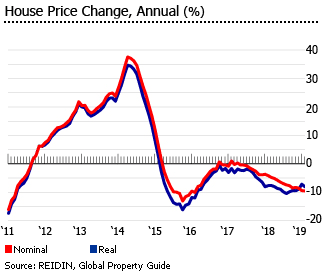
There was a 9.5% fall in Dubai’s all-residential property price index (RPPI) during the year to February 2019, the biggest y-o-y decline since February 2016, according to Reidin.com. When adjusted for inflation, Dubai house prices fell by 8%.
- Dubai’s apartment prices fell by 9.65% (-8.1% inflation-adjusted) during the year to February 2019.
- Villa prices fell 8.97% (-7.5% inflation-adjusted) y-o-y during the same period.
Abu Dhabi’s housing market is also depressed. There was a 7.12% y-o-y decline in Abu Dhabi´s all-residential property price index in February 2019.
- Apartment sales prices in Abu Dhabi suffered a price decline of 7.42% (-5.9% inflation-adjusted).
- Villa sales prices fell 6.16% (-4.6% inflation-adjusted).
In the first three quarters of 2018, the total value of property transactions in Dubai plunged more than 20% y-o-y to AED 162 billion (US$44.1 billion), according to Dubai Land Department (DLD). The number of transactions also fell by 23.7%.
The enormous excess supply pulling the market down
The supply glut is considerable. In 2018, about 43,000 units were added to Dubai’s total residential stock (which stood at around 491,000 units at end of 2017), and about 8,000 to the Abu Dhabi market (251,000 units at end of 2017), according to JLL MENA.
Also:
- the Federal Mortgage Cap, introduced in 2013, slowed residential price rises in Abu Dhabi and Dubai.
- the market was hit also by the implementation of the value added tax (VAT) in January 2018. The 5% VAT only applies to home sales after three years of the project’s completion. Sales within three years of completion have 0% VAT rate.
- the Dubai Land Department recently doubled property registration fees from 2% to 4% to dampen property demand.
The UAE’s economy grew by 1.7% in 2018, after the prior year’s meagre growth of 0.8% - sharply down from an average annual growth rate of 4.8% from 2011 to 2016. Economic growth is expected to accelerate to 3.5% this year, buoyed by strong non-oil sector activity.
Dubai´s property prices have been falling since 2014
From 2002 to 2008, Dubai’s property prices almost quadrupled, and large-scale developments turned Dubai into one of the fastest growing cities in the world.
Some of the biggest projects include Jumeirah Garden City (estimated cost: US$95 billion), Dubailand (US$64 billion), The Lagoons (US$25 billion), Palm Jumeirah (US$14 billion), and The World (US$14 billion).
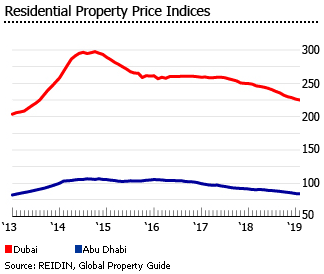
After March 2006, a deluge of foreign money boosted Dubai’s ambitions following the passage of the long-awaited foreign property ownership law.
Europeans, including Russians, accounted for 20% of the buyers of all property categories. GCC, Arab nationals and UAE nationals made up 28%, Asians 40%, and Iranians 12%, according to figures from Global Realty Partners.
Then the global credit crunch hit at the end of 2008.
Foreign investors disappeared. Transaction volumes plummeted. Almost half construction projects in the UAE, worth around AED1.1 trillion (US$582 billion), were either put on hold or cancelled.
As the economy returned to growth, halted construction projects were resumed. From January 2012 to end-2014 Dubai experienced skyrocketing house prices, averaging 21.5% annually. However, house price growth in Dubai slowed by end of 2014. In 2015, Dubai’s all-residential property price index (RPPI) fell by 11%, and Abu Dhabi’s RPPI fell by 0.8%, due to the significant drop in global oil prices, the strengthening of the US Dollar, the central bank’s Federal Mortgage Cap, and geopolitical tensions in the Middle East.
The housing market has been depressed since.
- In 2016, house prices fell by 0.4% in Dubai and by 3.7% in Abu Dhabi
- In 2017, house prices fell by 3.9% in Dubai and by 9% in Abu Dhabi
- In 2018, Dubai house prices dropped 8.56% while Abu Dhabi prices fell by 6.9%
Off-plan sales falling sharply
Off-plan sales transactions in Dubai plummeted by 30% in 2018 from a year earlier, according to Dubai-based real estate agency CORE. Then in the first two months of 2019 off-plan sales fell again by 7.8%, with 3,069 off-plan homes exchanging hands.
Yet off-plan sales still accounted for about 55% of all residential sales during the period, according to real estate portal Property Finder, in fact reflecting growth of off-plan sales in recent years due to the introduction of favourable payment plans and improved buyer protection.
Abu Dhabi has strengthened the protection of off-plan buyers. Its recent real estate law (No. (3) of 2015) appoints Abu Dhabi’s Department of Municipal Affairs (DMA) as real estate regulator, performing the same functions as Dubai’s RERA. The reforms, as outlined by The National, include:
- A central government database/register for all property projects in Abu Dhabi, including off-plan sales;
- Developers are only allowed to charge DMA-approved administrative fees, and are barred from collecting registration fees from investors;
- Rules are laid down for the creation of owners´ associations;
- Developers are allowed to sell off-plan units as long as they own a real estate right over the project land. A "disclosure statement" is also required, providing information on the development to home buyers.
- Developers marketing off-plan units are required to open an escrow account.
- In case of "substantial prejudice", off-plan buyers can terminate their purchase.
- Developers will be fined by the DMA if their projects are delayed by more than six months. If there is a significant delay, the new law allows for cancellation of projects or the appointment of anew developer.
- A 10-year liability period for developers regarding structural building defects.
Better terms for expats have been introduced
A new system for long-term residence visas for foreign investors and professionals was put in place in February 3, 2019. It allows expats to live, work and study in the country without needing a national sponsor. They can also enjoy 100% ownership of their business. These visas will be issued for 5 or 10 years and will be renewed automatically.
Eligibility for a 10-year visa:
- Investors in public investments of at least AED 10 million (US$2.72 million)
- Persons with specialized talents, such as doctors, scientists, specialists, inventors, as well as creative individuals in the field of culture and art
Eligibility for a 5-year visa:
- Investors in a property in the UAE of a gross value of not less than AED 5 million (US$1.36 million). The amount invested in real estate must not be on loan basis and the property must be retained for at least 3 years.
- Entrepreneurs with an existing project with a minimum capital of AED 500,000 (US$136,000)
- Outstanding students
Foreign ownership rules are now very liberal
Foreign ownership rules are quite liberal:
- Foreign nationals are now allowed to buy freehold properties in designated areas in Dubai.
- Gulf Cooperation Council (GCC) nationals are allowed freehold ownership anywhere in the Emirates.
- Abu Dhabi’s government introduced new regulations in 2014 allowing foreigners to own property in designated investment zones on a freehold basis. Previously, foreign investors were generally limited to leasehold arrangements with 99-year leases. This followed Abu Dhabi’s previous market-boosting measures. In 2012, the government compelled public sector employees living outside Abu Dhabi to relocate within the emirate’s borders. Then in November 2013, the government cancelled a 5% cap on annual rent increases.
Most residential property buyers in Dubai are UAE nationals, followed by Indians, Saudis, British, and Pakistanis.
There´s money to be made - rental yields in Dubai are moderate to good
Gross rental yields in Dubai are moderate to good, ranging from 5.2% to 5.9%, according to the Global Property Guide’s research. Smaller apartments (90 sq. m.) have higher yields, averaging 5.91%, while medium-sized apartments (120 sq. m.) have yields averaging around 5.19%.
The difference in yields stems from the lower cost of the smaller apartments in per sq. n. terms. This is an unusual pattern - smaller apartments usually are more expensive than larger apartments (per sq. m.) in the other major world cities.
Rents are falling, however
Rental rates of residential properties are declining in both Dubai and Abu Dhabi, according to Reidin.com.
- In Dubai, rental rates for all residential units were down 10.77% in February 2019 from a year earlier. Rental rates for apartments fell by 11.56% y-o-y, and for villas by 5.29% y-o-y over the same period.
- In Abu Dhabi, the average rental rate for all residential units declined by 9.56% y-o-y in February 2019. Over the same period, rental rates for apartments dropped 9.48%, while villa rental rates fell by 9.94%.
In 2018, annual rents in Dubai ranged from AED 65,000 (US$17,696) for one-bedroom apartments to AED 127,000 (US$ 34,575) for three-bedroom apartments, according to Asteco.
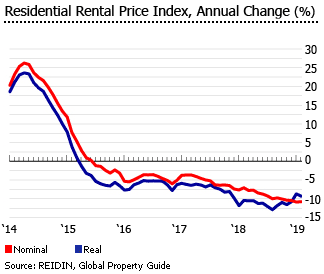
Rents in specific high-end developments in Dubai (according to Asteco):
- At the DIFC, a special economic zone in Dubai, rents ranged from AED 90,000 (US$ 24,502) per annum for one-bedroom apartments to AED 175,000 (US$ 47,642) for three-bedroom apartments.
- In Downtown Dubai, home to the towering Burj Khalifa skyscraper, rents for one-bedroom apartments averaged AED 83,000 (US$ 22,596) per annum, while rents for three-bedroom apartments stood at AED 170,000 (US$ 46,281).
- In Palm Jumeirah, the world’s largest man-made island, rents ranged from AED 98,000 (US$ 26,680) per annum to AED 180,000 (US$ 49,004) for three-bedroom apartments.
In Abu Dhabi, rents ranged from AED 79,000 (US$ 21,507) for one-bedroom apartments to AED 146,000 (US$ 39,747) for three-bedroom apartments in 2018.
Rents for high-end properties in Abu Dhabi:
- In Central Abu Dhabi, annual rents for one-bedroom apartments averaged AED 80,000 (US$ 21,779); two-bedroom apartments for AED 106,000 (US$ 28,858); and three-bedroom apartments for AED 148,000 (US$ 40,292).
- In Corniche, annual rents for studio apartments ranged from AED 83,000 (US$ 22,596) for one-bedroom apartments to AED 145,000 (US$ 39,475) for three-bedroom apartments.
- In Al Raha Beach, annual rents were from AED 90,000 (US$ 24,502) for one-bedroom apartments to AED 170,000 (US$ 46,281) for a three-bedroom apartments.
- At the Marina Square, one-bedroom apartments were rented for AED 70,000 (US$ 19,057) per year, and three-bedroom apartments for AED 140,000 (US$ 38,114)
Rent cap laws have returned, but are more pro-landlord now.
Since December 2013 a new rent cap law, Dubai Decree No. 43/2013 (the "New Decree") has imposed a 20% rent increase cap, just like the previous rent cap law (Decree No. 2 of 2011, known as the "the Old Rent Cap"), which had been temporarily abolished.
However landlords can now increase rents on lease renewal, or as soon as the rent for a property falls 11% below the average market rental rate. The New Decree also makes clear that the rent cap also applies to special development areas and free zones, including the Dubai International Financial Centre (DIFC).
NEW RENTAL LAW |
|
| Current rental rates | Rent increase for 2013 |
| If existing rent is: | |
| Equal to or 10% below the average rental rate | Nil |
| 11% to 20% below the average market rental rate | 5% |
| 21% to 30% below the average market rental rate | 10% |
| 31% to 40% below the average market rental rate | 15% |
| More than 40% below the average market rental rate | 20% |
In Abu Dhabi, the Department of Municipal Affairs and Transport (DMAT) has reinstated (on December 13, 2016) the annual 5% rent cap, which had been abolished in 2013.
In October 2018, the Abu Dhabi Judicial Department issued new rules that will make it easier for landlords to evict tenants.
The new rules allow landlords with lease contracts registered with Abu Dhabi Municipality to approach the Enforcement Department directly to claim outstanding rent and repossess their property. Previously, landlords had to go through a legal process to evict a tenant, which typically takes up to 6 months.
“This initiative, the first of its kind in the region, and supports the efforts to create an attractive environment for real estate investment in Abu Dhabi by enhancing the confidence of real estate owners and tenants in an efficient litigation mechanism that ensures simplification of procedures and speedy settlement of disputes,” said ADJD under secretary Yousef Saeed Al Abri.
Interest rates are heading up
The Central Bank of the UAE raised its benchmark rate by 25 basis points to 2.75% in December, following the US Federal Reserve rate hikes. In March 2019, the Fed left its key rate unchanged and expects no rate hikes in 2019, which UAE is likely to follow.
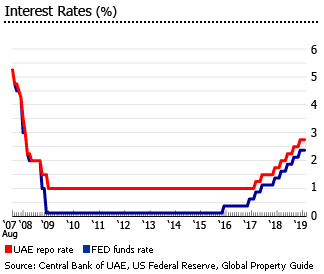
Mortgage interest rates in Dubai have, in the past, followed key US Fed rates, because the dirham (AED) is pegged to the US dollar at AED3.67 = US$1. Some banks offer mortgage loans to both nationals and expatriates, with interest rates ranging from 2.99% to 3.49%.
Tight mortgage rules have constrained the housing market
More fixed-rate mortgage products have been introduced in the last decade. "Fee free" products have allowed borrowers to switch to a new lender at a lower cost since the last quarter of 2010. Tamweel, one of the largest Islamic mortgage lenders, is back in the market, having stopped trading its mortgage shares in November 2008 due to the global credit crunch.
However a new set of mortgage regulations was introduced to cool the property market in October 2013, strongly affecting sales. The rules involved lower Loan-to-value (LTV) rates, as follows:
UAE Federal Mortgage Caps (Maximum Loan-To-Value Ratio) |
|||
| First home (Owner-occupier) | Second home or investment property | Off-plan purchase | |
| NATIONALS | |||
| Property valued under AED5 million (US$1.36 million) | 80% | 65% | 50% |
| Property valued over AED5 million (US$1.36 million) | 70% | 65% | 50% |
| EXPATRIATES | |||
| Property valued under AED5 million (US$1.36 million) | 75% | 60% | 50% |
| Property valued over AED5 million (US$1.36 million) | 65% | 60% | 50% |
| Sources: UAE Central Bank, Cluttons | |||
Recently, there have been calls for the central bank to relax mortgage lending rules.
Economic growth improving
The UAE’s economy grew by 1.7% in 2018, up from the prior year’s meagre growth of 0.8%, but still sharply down from an average annual growth rate of 4.8% from 2011 to 2016.
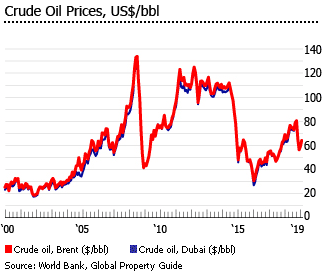
Higher oil and gas income was one of the main drivers of overall growth, contributing about 25.9% of the country’s GDP last year, according to Minister of Economy Sultan bin Saeed Al Mansouri.
Brent oil prices surged by more than 30% to an average of US$71.34 per barrel in 2018 from US$54.71 per barrel a year earlier, after OPEC members and other oil producers cut production to address a supply glut.
Dubai’s economy expanded by 1.94% in 2018, down from the prior year’s 3.1% growth and its slowest pace in eight years, according to Dubai Statistics Center. Abu Dhabi’s oil-rich economy was estimated to have grown by about 1.5% last year.
To offset the slowdown in economic growth, the Dubai government introduced new measures to cut costs for key industries including real estate, aviation, and education.
In addition, the Abu Dhabi government has recently unveiled a US$13.6 billion economic stimulus package, as well as several initiatives to attract investment.
The UAE’s economy is expected to grow by 3.5% this year, buoyed by strong non-oil sector activity.
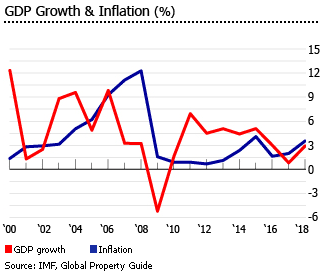
“We expect the UAE economy to gradually pick up in 2019,” said Parth Kikani of Emirates NBD Asset Management. “We also expect Expo 2020 Dubai to be a catalyst for growth as corporate sector set up a presence in the Emirates.”
Inflation was -2.39% in January 2019, sharply down from inflation of 4.76% a year earlier, amidst a persistent decline in housing and fuel prices and an oversupply in the retail and hospitality sectors, according to the Federal Competitiveness and Statistics Authority (FCSA). Abu Dhabi and Dubai registered deflation of 0.9% and 3.6%, respectively.
The non-oil sector is strong and growing rapidly
At the federal level, the UAE’s "2021 Vision" positions science and technology, research, and innovation at the centre of a knowledge-based and highly competitive economy by 2021.
Non-oil sectors already account for around three-fourths of the country’s GDP. More specifically, the retail and whole trade sector contributed about 11.2% of GDP in 2018; the financial sector, 9.2%; manufacturing, 8.9%; and building and construction sectors, 8.3%, among others.
Recently, Minister of Economy Sultan bin Saeed Al Mansouri assured that UAE is on track to deliver the UAE Vision 2021, which will develop the country’s non-oil sector and reduce its dependency on oil revenues.
The non-oil sector grew by 2.9% y-o-y in 2018 to US$1.13 billion, according to the FCSA, and is projected to grow by 3.4% in 2019 while the oil sector will expand by 3.7%.
“The UAE economy has been adapting well to a prolonged decline in oil prices since 2014,” said Michael Armstrong, FCA and ICAEW regional director for the Middle East, Africa and South Asia. “For instance, the introduction of VAT in 2018 has been a historic milestone and is expected to substantially strengthen and diversify government revenues in the coming years.”
Sources:
- UAE Real Estate Market Report 2018 (Reidin.com): http://blog.reidin.com/uae-real-estate-market-report-2018/
- Dubai/Abu Dhabi Residential Property Price Indices: February 2019 Results (Reidin.com): http://blog.reidin.com/dubai-abu-dhabi-residential-property-price-indices-february-2019-results/
- World Economic Outlook Database, October 2018 (International Monetary Fund): https://www.imf.org/external/pubs/ft/weo/2018/02/weodata/weoselgr.aspx
- Gross rental yields in Dubai are now moderate (Global Property Guide): https://www.globalpropertyguide.com/Middle-East/United-Arab-Emirates/Rental-Yields
- United Arab Emirates Interest Rate (Trading Economics): https://tradingeconomics.com/united-arab-emirates/interest-rate
- Best mortgage rates in UAE 2019 (Compare4Benefit): https://www.compare4benefit.com/blog/best-mortgage-rates-in-uae-2018-money-clinic/
- UAE banks group considers asking for ease in mortgage rules (Reuters): https://www.reuters.com/article/emirates-banks-mortgages/uae-banks-group-considers-asking-for-ease-in-mortgage-rules-idUSL5N1VY4FW
- U.A.E. Economic Growth Accelerates in 2018 But Misses Estimates (Bloomberg): https://www.bloomberg.com/news/articles/2019-03-31/u-a-e-economic-growth-accelerates-in-2018-but-misses-estimates
- UAE economy rebounds in 2018, but more slowly than expected (Reuters): https://www.reuters.com/article/us-emirates-gdp/uae-economy-rebounds-in-2018-but-more-slowly-than-expected-idUSKCN1RC0GJ
- National Accounts (Dubai Statistics Center): https://www.dsc.gov.ae/en-us/Pages/NationalAccounts.aspx
- Stimulus to support UAE markets in 2019, analysts say (The National): https://www.thenational.ae/business/economy/stimulus-to-support-uae-markets-in-2019-analysts-say-1.807782
- UAE cost of living eases as consumer price index falls 2.38 per cent in January (Gulf News): https://gulfnews.com/business/uae-cost-of-living-eases-as-consumer-price-index-falls-239-per-cent-in-january-1.62450465
- Consumer Price Index (Federal Competitiveness and Statistics Authority): http://fcsa.gov.ae/en-us/Pages/Statistics/Statistics-by-Subject.aspx#/%3Fsubject=Economy&folder=Economy/Prices/Consumer%20Price%20Index&year=2018
- UAE Expected to Slip Into Deflation in 2019 (Albawaba Business): https://www.albawaba.com/business/uae-expected-slip-deflation-2019-1263004
- UAE economy grew 1.7% in 2018 on non-oil sector growth and higher oil prices (The National): https://www.thenational.ae/business/economy/uae-economy-grew-1-7-in-2018-on-non-oil-sector-growth-and-higher-oil-prices-1.843335
- UAE economy to grow 3.5% in 2019 led by non-oil sector (Gulf Business): https://gulfbusiness.com/uae-economy-grow-3-5-2019-led-non-oil-sector/
- Non-oil sector drives UAE growth (Khaleej Times): https://www.khaleejtimes.com/business/economy/non-oil-sector-drives-uae-growth
- Abu Dhabi makes it easier for landlords to evict tenants (Gulf Business): https://gulfbusiness.com/abu-dhabi-makes-easier-landlords-evict-tenants/
- Dubai realty check: Property buyers are back with increased transactions (Zawya): https://www.zawya.com/mena/en/business/story/Dubai_realty_check_Property_buyers_are_back_with_increased_transactions-SNG_141036541/
- First 10-year UAE residency visa granted to 20 expats (Khaleej Times): https://www.khaleejtimes.com/nation/20-expats-get-10-year-uae-visa-
- Long-term residence visas in the UAE (Government.ae): https://government.ae/en/information-and-services/visa-and-emirates-id/residence-visa/long-term-residence-visas-in-the-uae
- Off-plan residential property sales in Dubai fell by 30% in 2018 (Gulf Business): https://gulfbusiness.com/off-plan-residential-property-sales-dubai-fell-30-2018/
- Half of Dubai homes sold so far this year were off-plan (The National): https://www.thenational.ae/business/property/half-of-dubai-homes-sold-so-far-this-year-were-off-plan-1.841557